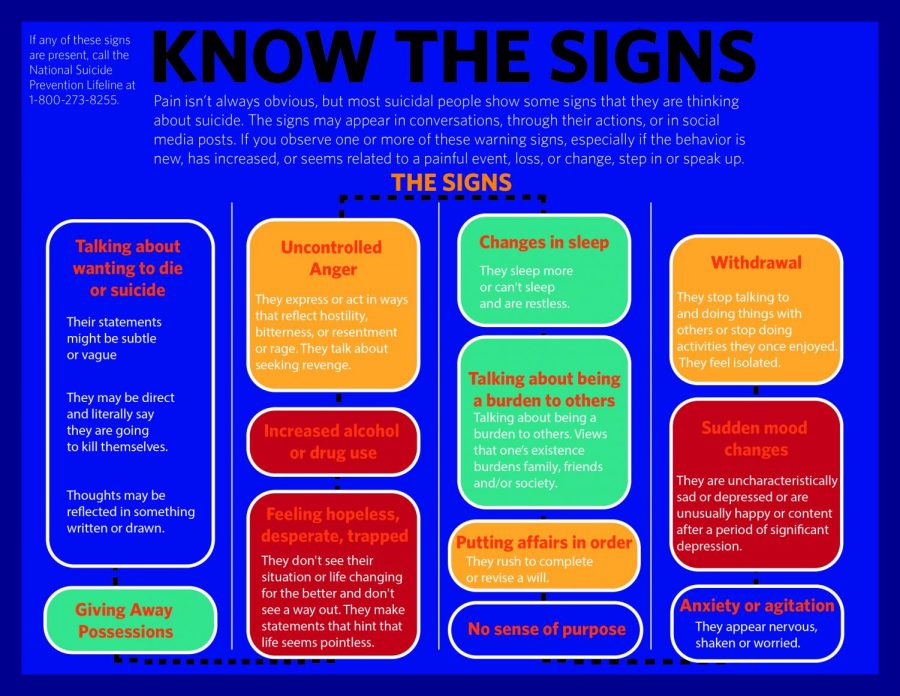How to spread awareness for suicide awareness month
Know the Signs
September 18, 2020
September is Suicide Awareness month: 30 days reserved for sparking important conversations and sharing resources with anyone who is struggling mentally and emotionally. Spreading awareness is important for those who feel lost or unwanted. Having access to resources that help them realize everything is going to be okay and that they are wanted here is crucial 365 days of the year, but now especially.
Here are four things to do to spread awareness.
Use your platform on social media
Facebook, Instagram and Twitter are huge social media platforms that reach a lot of people when it comes to spreading awareness for anything. However, there is a right way and a wrong way to share information online. For sensitive subjects like these, content must be serious and informative. Organizations like National Alliance on Mental Illness or the American Foundation for Suicide Prevention are reliable places to get information to post.
Something as simple as sharing a screenshot of suicide prevention hotline numbers, links to becoming an advocate for suicide prevention not only shows empathy but provides help. The phone numbers for NIU’s Counseling and Consultation Services is (815) 753-1206, and if you’re not on campus the National 24-hour Suicide Prevention Lifeline is 800-273-8255.
A wrong way to post awareness, however, is using popular platforms to spread jokes about suicide. Seeing this on TikTok can trigger a lot of emotions; mostly anger, frustration and a lot of memories.
Know the signs and reach out
The warning signs for suicide or suicidal thoughts can be visible, but they could look different from person to person. For myself, some signs would be no sense of purpose, withdrawal or feeling like I have no control over anything in my life. While these are very common, talking about being a burden or talking about wanting to die can also be signs of suicidal thoughts, according to the Know the Signs Website.
When it comes to stepping in, trying to start a conversation isn’t easy. A few things one could take into account to make the conversation easier are to start by asking “How are you doing?” No matter how they answer or how the conversation goes, it’s very important you listen to everything they have to say even if you don’t know what to say. Sometimes listening is enough.
In a Ted Talk done by Lori Prichard on Aug.22 she talked about the loss of her husband who had killed himself in August 2019. After sharing a video of him on his birthday, she shared a sentiment from her experience.
“I don’t know how I could have been so blind,” she said in the Aug. 22 Ted Talk. “It’s as plain as day and it haunts me.””
During the Ted Talk, Prichard describes what it was like to understand what her husband was going through until after he died by looking back at old photos and videos. She knew then her husband didn’t look happy, that something wasn’t right.
What not to do
When it comes to talking to someone about their well being, don’t ask them any question in a harsh or hostile tone of voice. For example, don’t ask questions like, “You’re not thinking of suicide, are you?” Asking questions that have a negative connotation could do more harm than good to someone who is struggling mentally and emotionally. Remember that these people could be your friends, family or other individuals that you care about, so you want to treat their feelings with respect.
There have been many times I thought I was safe or comfortable when confiding in someone with my problems, until they told me “It’s just in your head,” “You’ll be fine” or ”You’re just saying that to get attention.” Each time I’ve been told that there are mixed emotions between frustration and feeling crazy because I felt like there would never be someone that understood what I was going through.
Another thing is don’t make videos joking about suicide or respond by saying ‘same’ when someone opens up. As someone with a history of mental health, I go to TikTok to find funny videos when I feel overwhelmed, so seeing videos of people joking about suicide make it harder for someone to ask for help if they think most people think of it as a joke.
Creating a safe place
I know what it’s like to have and not to have a safe place when I need to express my feelings. In my experience dealing with mental health, it could take a person time to build up trust with someone to ask for help or feeling comfortable in a new environment.
Something you can do is create a safety plan. This is a written document for someone with suicidal thoughts to keep with them, according to Centre for Suicide Prevention. One aspect to the safety plan is to create a list of people who can call for help in the middle of a crisis, or a list of places one can go when they want to feel safe.
My best advice when creating a safe place is to never allow for shaming or emotional violence. Apologies when needed are given sincerely when someone feels hurt or has been hurt by something that was said once in the safe place. Most importantly all thoughts, feelings or ideas should be treated with respect and kindness.







